




“
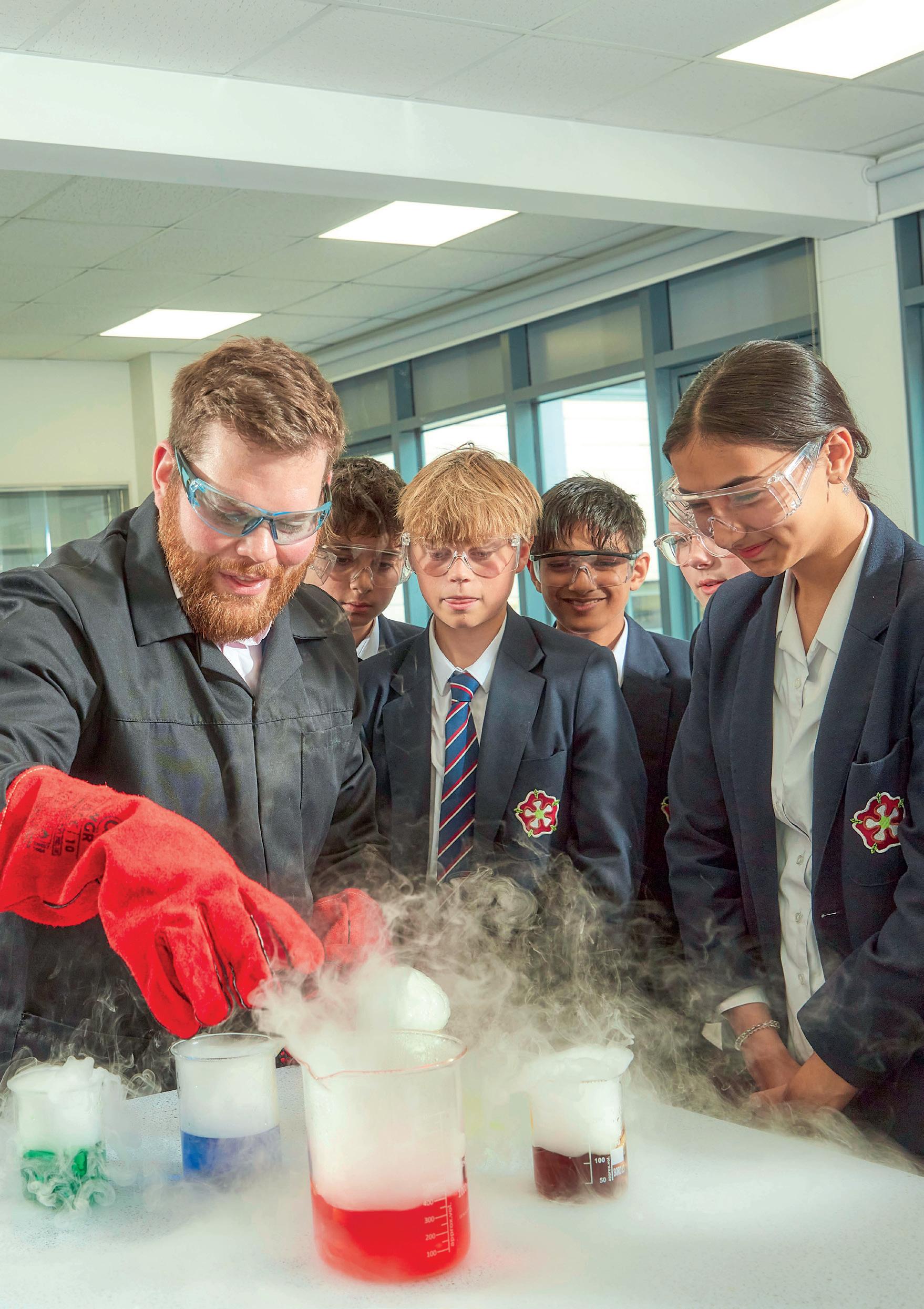
PROUD TO REMAIN ACADEMICALLY PACY BUT EQUALLY PROUD THAT IT’S ALSO AN ENRICHING AND NURTURING SCHOOL IN WHICH PUPILS THRIVE. TOP LEVEL TEACHING, GREAT CREATIVE AND EXTRACURRICULAR OPPORTUNITIES AND INCREASINGLY PASTORALLY AWARE, KES TICKS ALL THE BOXES AS A VERY ALLURING OPTION IN BATH.
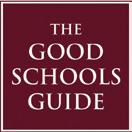
Since 2008, Martin Boden PGCE, MA. Worked in education since graduating from Cambridge, initially teaching languages and games at Bolton School before moving to Cheadle Hulme School. After a stint at Bradford Grammar School as head of modern languages, he moved to King Edward’s in 2005 as director of studies before taking on the headship a few years later. He continues to teach German A Level, which is an important way of him feeling connected to his students and the teaching profession.
Mr Boden is an ideal fit for King Edward’s School. He has the intellectual heft, with his Cambridge degree and sharp mind, to lead a school that has a reputation for academic success. However, this is tempered by his northern roots and down to earth nature which help ensure that the school continues to produce grounded pupils (being humble is one of the school’s values) who want to work hard. ‘Our peer ethos is so important. There’s a default understanding and expectation to do well, from me at the top and then it spreads out from colleagues, from parents and, of course, the pupils.’
This is a school that has always been Bath’s academic A-team, but it offers so much more than academics, something that has, occasionally, been (wrongly) overlooked by local parents. Mr Boden
has played a pivotal role in ensuring that KES champions all aspects of school life beyond the classroom. Over time, the arts have found greater prominence, extra-curricular offerings have widened and latterly the pastoral curriculum has been enriched.
What for the future we asked? ‘Well, my work here is done!’ came the very much tongue in cheek response, swiftly followed by an ebullient, ‘No!’ And we believe him. He noted that much was about maintaining where they are - it would be hard to uplift grades any further – but that he also has his sights set on giving the performing arts departments an improved theatre space, which he firmly believes they deserve.
With two children at the senior school and wife, Jane, also Head of Geography there, Mr Boden’s life remains busy at home. However, he still finds time for music (guitar and drums), recently playing some Queen at the school’s music marathon. When time allows, he heads back north to smell the fresh air of the Lake District.
Main entry point is year 7 with a few (5 – 10) arriving in years 8 and 9 and occasionally year 10. Most arrive from local primary schools with some transferring from other preps in the area. Majority of junior school pupils transfer to senior school and make up just under half of the cohort.
Entry is secured via written assessments (English, maths and verbal reasoning) plus a short interview and school references and reports. Knowing many come from state primaries (and don’t therefore get access to relevant exam practice) a handy exam preparation session is offered by the school.
Approximately 25-30 join the sixth form. Students must achieve a minimum of 54 points from their best nine GCSEs (including passes in English language and maths). Grade 7 or above is (ideally) needed for any chosen A Level or related subject. Offers are made based on predicted grades, reports and references from current school and after three interviews.
No more than 10 per cent leave after GCSEs either for state, other independents or specialist colleges.
Post A Levels, the vast majority (about 70 per cent) head to Russell Group universities, popular choices being Exeter, Leeds, UCL, Bristol, Edinburgh. In 2024, six to Oxbridge and 15 to medical school plus two to Brown and Tufts universities in the US.
All we spoke to said that KES pupils are genuinely interested to learn and this, combined with a teaching staff who push themselves to deliver top notch lessons, means that outcomes are excellent for a school that is not quite as academically selective as some may think. Head calls this the ‘critical mass’ theory – if you’ve got enough behaving
in a certain way, more will follow. Head of academics adds, ‘It feels no chore to learn here. When pupils leave lessons, they talk about what they’ve just done rather than what they were up to last night.’ That was certainly corroborated by pupils we spoke to – yes, they work hard but not in an arduous fashion. One parent noted, ‘My children have not been stressed at KES. Yes, they had been put under some pressure, but to an appropriate degree.’ They added that ten years ago it may have been a little heavy handed with homework but that this had changed.
School feels it has a good balance between the traditional - exercise books still rule - while also exploring what’s new and exciting in the technological world. Year 12s are currently trialling a ‘bring your own device’ to school. There’s been heavy investment in computer science with top of the range computers in the creative suite (courtesy of Microsoft sponsorship) primed for coding and e-sports. But, increasing their technological reliance is being treated with appropriate caution by the head, ‘It changes how the brain develops, and we want to make sure it is the right decision,’ adding, ‘Ten years ago we trialled using iPads rather than textbooks in a subject. Results ended up being the same and students said they preferred the doorstop books, with tablets being a welcome add-on’.
Lower down, the curriculum is broad and remains so for GCSE: plenty err towards the academic subjects (separate sciences for most and a language compulsory) but there’s also

KES PUPILS ARE GENUINELY INTERESTED TO LEARN AND THIS, COMBINED WITH A TEACHING STAFF WHO PUSH THEMSELVES TO DELIVER TOP NOTCH LESSONS, MEANS THAT OUTCOMES ARE EXCELLENT “
usually two sets for creative subjects. All students start with four A Levels (option to drop one after year 12) and there’s a good range (27) to choose from: school prides itself on its breadth of offering. Maths and the sciences are popular but less mainstream subjects such as AS electronics, A Level classical civilisation or classical Greek are equally championed. There’s no sense that one should be an academic machine in sixth form: drop-in clinics are run for every subject if support is needed.
If that wasn’t enough to whet the appetite, there’s also a panoply of academic societies and clubs such as Socrates debating, creative writing club (the short stories we read in the school’s Anthology booklet were excellent) and principia physics extension group.
Full-time SENCO has strategic responsibility for all three school sites as well as day-to-day running of the senior school. Approximately 15 per cent of pupils have mild SEN needs (processing challenges, dyslexia, some with ASD or ADHD). Training given to ensure lessons are differentiated with additional support offered via subject specific drop-in clinics. Some receive one-to-one support (extra cost). Private in-house assessor to renew access arrangements at a reduced cost and external therapists brought in if needed. A candidate with significant physical needs may find the site challenging but school happy to chat about adaptations.
The reputation that KES is driven by its academic provision is categorically a thing of the past. The creative curriculum is enriching with one parent adding, ‘They genuinely have a wide offering and have evolved to go beyond the academics.’
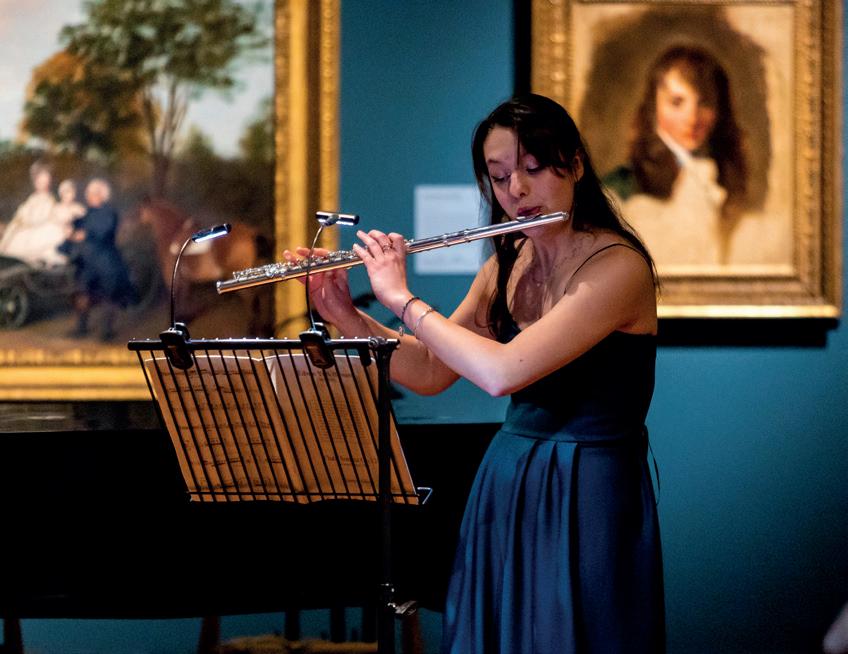
Music is a busy and high-profile department. Nearly 30 per cent of students play at least one instrument and there is a myriad of choirs, ensembles and clubs to get involved in (three choirs, two full orchestras, 13 ensembles, music tech and a theory club). Most err towards the traditional but there are a few more edgy clubs such as the KES Jazz and Funk band. A partnership with Bath Philharmonia allows orchestral pupils to perform with them in a gala in the city and have access to masterclasses with some of the stars. They also have success at the Bath Young Musician of the Year often winning the competition. School puts on a knock-out carol service in Bath
Abbey and provides choristers to sing there during the year. The CCF corps of drums play in the city’s Remembrance Parade and groups perform at the hospital throughout the year. They also have a grandly titled ‘Resident Composer’ who, rather like the Poet Laureate, is expected to produce original works each year.
Drama successfully blends creativity and intellectual challenge. When we toured, year 9 were working on a project about how to create theatre through a modern interpretation of Antigone and A Level students were producing scripts for their exam performance, one of which was using the story of Robin Hood as a metaphorical interpretation of Trump. Much effort for big productions to be as inclusive as possible. For a recent Shakespeare production there were three different actors for Macbeth and Lady Macbeth - each act was set in a different era to make this adjustment feel innovative and relevant. LAMDA is ever growing and there are plans to add more informal projects to the calendar, like a cabaret night.
Art department is thriving with plenty of specialist teachers (many of whom are artists in their own right) and classrooms. A range of media used: lino cuttings to intricate pencil drawings, clay sculptures to large oil paintings. Photography department impressive with a dark room and studio set up for shoots. Head of art also puts on art exhibition for the public in town with other schools. DT boasts the traditional work benches but also the technological equipment one now expects such as 3D printers.
Masses of breadth on extra-curricular timetable (coding to toy making, Warhammer to textiles, girls’ football squad to cyber security club) with plenty of enthusiasm from pupils to get involved, either at lunch time or at the end of the day. CCF, which is done with a local secondary school, is well attended and benefits from MOD funding for summer camp. Ten Tors and DofE also popular.
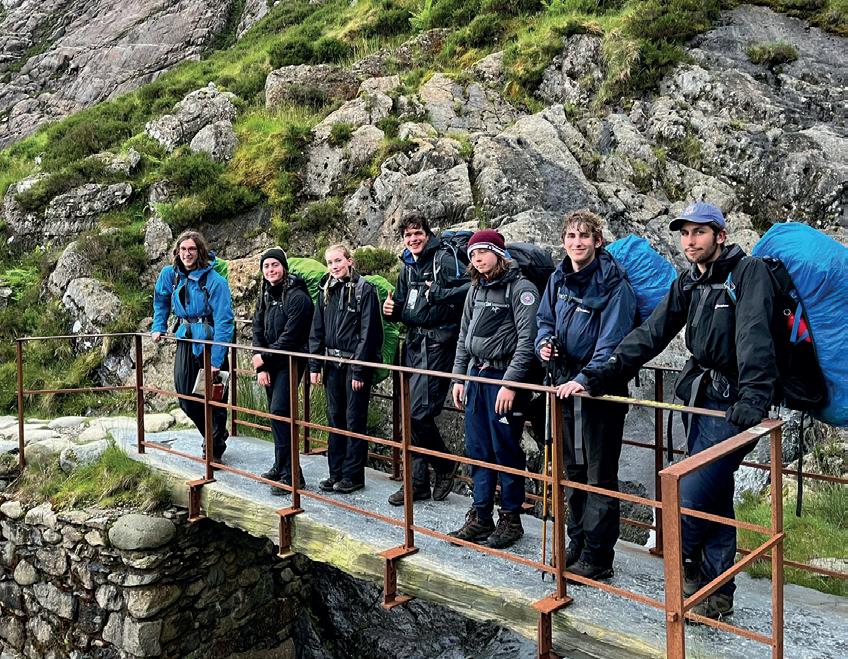
Whole school activities week in the summer term. Year 7 all do outward bound stuff; other years get to choose from a range of overseas and local trips (Iceland, Pompeii or doing a play in a week at school). Head of co-curricular charged with balancing costs of trips for parents and ensuring that they’re enriching experiences.
KES are strong contenders to win trophies amongst local competitors –when we visited posters advertising a special Friday night rugby match with their main rival, Kingswood, were being put up around school. Rugby,
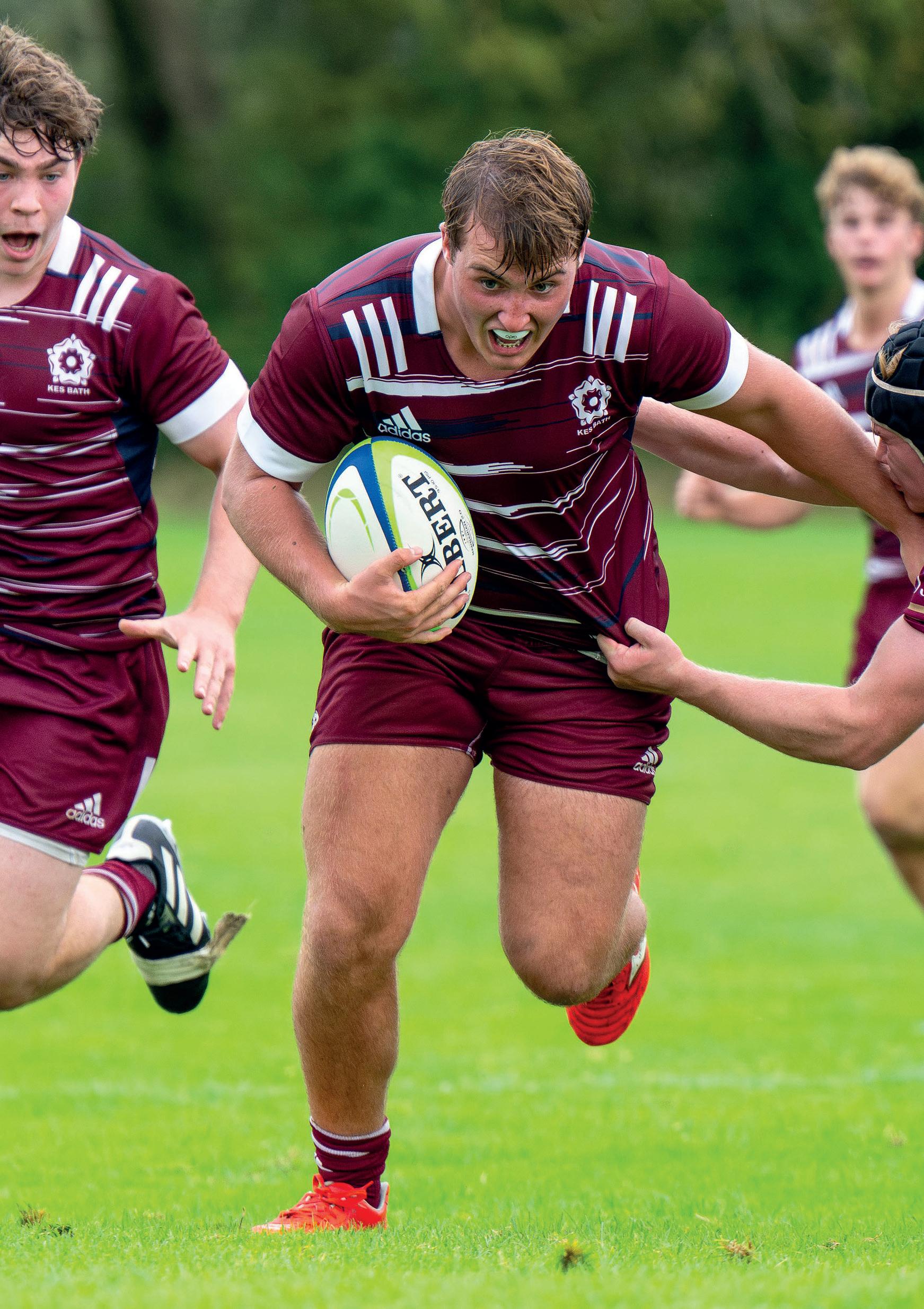
RUGBY, NETBALL, HOCKEY AND CRICKET ARE THE CORE SPORTS (FOOTBALL AVAILABLE FROM YEAR 11) WITH PUPILS IN EACH MAJOR SPORTING DISCIPLINE BEING ON AN ELITE PATHWAY OUTSIDE SCHOOL
netball, hockey and cricket are the core sports (football available from year 11) with pupils in each major sporting discipline being on an elite pathway outside school – 13 for rugby, 12 for netball, 27 for hockey and 9 in cricket. Two pupils are now even in the U16 England Hockey squad. Much effort to get everyone to play in fixtures: lots of teams play on a Saturday and they do other fixtures mid-week. Some parents get frustrated, believing that the sports department is prioritised over other interests, like the performing arts, but others are happy with the status quo.
Department now employs specialist coaches to work alongside the staff coaching team, which they believe breeds confidence and engagement in sport. Astro pitch is on site with other playing fields a short bus ride away. School also uses some of the University of Bath’s facilities (including their pool) which are nearby.
Gym recently opened with space for strength and conditioning training as well as cardio fitness. Department increasingly focused on finding a ‘sport for life’ for older students – they can choose from activities like squash, outdoor walks or spin classes rather than team sports.
Founded nearly 500 years ago by a young Edward VI to provide a school ‘for the instruction of boys and young men in grammar.’ The location may have changed over the centuries, but its core roots are still evident today with one parent describing it as a ‘fee paying grammar school.’ After visiting,
we would describe it as a ‘grammar plus’ school – yes, it’s academically selective and there’s a drive for all to perform but this is balanced by a huge effort to nurture the whole child. KES alumni indicate the range of talent that is produced: a clutch of rugby players (Guy Mercer, Henry Thomas and Max Ojomoh); comedian, Bill Bailey; former cabinet minister, John Glen; former commander-in-chief of the allied forces in northern Europe, General Sir Jack Deverell and scientist, Sir Chris Rapley.
The compact site is on the outskirts of southern Bath and has stunning views over the city (when we toured, we couldn’t help but stop and admire the townscape from many of the classrooms!). The views may be impressive but the look of the older buildings from the outside is less so. One parent, a number of years ago, announced to the head that, ‘We send our child to KES despite the buildings not because of them!’ Things have noticeably improved - constructing higher quality spaces is a key aim of the head under the mantra, ‘Do it once, do it well.’ The relatively new Wessex building (housing the library and dining hall) is striking, the sixth form centre is warm and welcoming, and a new pastoral and academic block was under construction when we toured. Plans are afoot to replace the slightly tired looking performing arts theatre. Pupils say they’re happy with the food provided: there’s a hot option alongside an impressive salad bar and a daily pasta and baked potato station. Takeaway lunches are no longer an option, part of an aim to reduce plastic on site
and make the dining hall a social hub. Break times are spent knocking a ball around the Astro, catching up with friends or hanging in the sixth form centre. No phones allowed except in sixth form centre.
Longstanding relationship with Moving Mountains charity in Kenya gives pupils an understanding of life out there. Local charities supported and KES receives high scores with DofE for the number of hours its students put into volunteering – pupils are not shy of graft here.
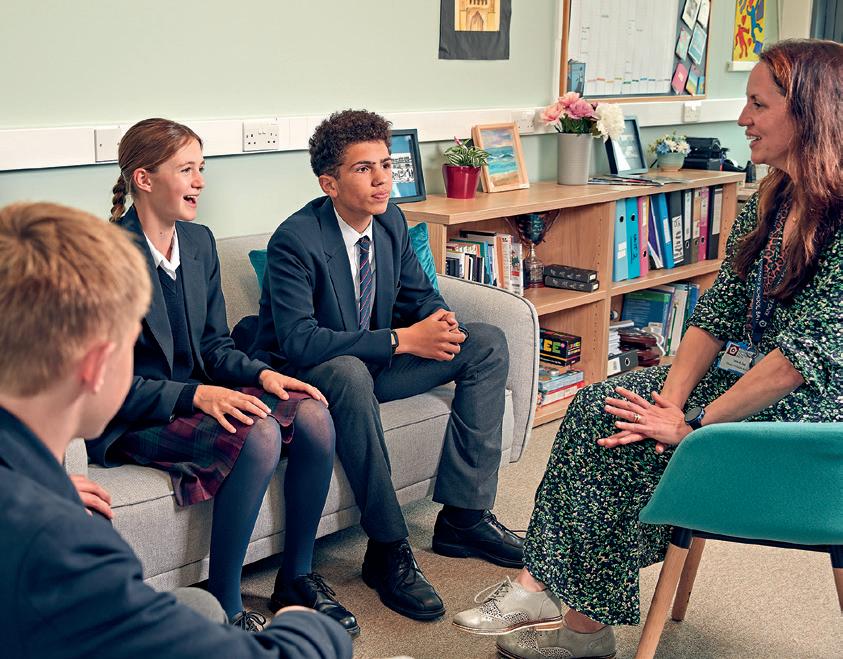
Pastoral care at KES has been boosted in recent years with several worthwhile innovations. There’s now a tailor-made pastoral programme - gone are the ever-changing acronyms for the subject (PSHE, PCHCE, PHCEE), replaced by the much more meaningful title ‘Learning for Life.’ Every two weeks the whole school spends an hour grappling
with relevant teen issues from vaping to consent, racism to cyber safety. Initially met with some eye rolling from these cynical students, but most have been quick to praise its benefits once they saw the quality of the lessons and talks. School has also invested in an online service for parents, staff and students, ‘The Wellbeing Hub,’ which is run by mental health experts, ‘Teen Tips’. For more support, the health and wellbeing centre has a nurse (a trained mental health lead); there’s a listening service, delivered by the charity ‘Off the Record’, and a school counsellor comes in once a week.
Boosting behaviour has been a recent focus. There had never been any major infractions but just the need, post Covid, to raise standards on the finer details: shirts being tucked in; less chat in lessons amongst the older students and keeping the site clean and tidy. It’s certainly paid off because teachers are dishing out fewer sanctions than ever before. Plenty of opportunity for celebrating positive behaviour with age-appropriate rewards (apparently year 11 can still be suckered in with a lollypop!). Not a huge amount of crosspollination between year groups as they are tutored horizontally and there’s no house system. However, there is a vertical mentoring programme in which an impressive 200 students participate.
Pupil voice is celebrated, and school council brings about real change: more seating outside, a change to school lanyards and even an alteration to the registration process of the pupils. The sustainability committee is particularly active. KES aims to be the ‘greenest’
school in Bath: it has electric vehicles; one student has re-designed the recycling bins and solar panels now supply 40 percent of the site’s energy needs.
Being where it is, KES is not a particularly diverse school. However, it’s a welcoming and accepting one which looks for opportunities to celebrate diversity and promote inclusion through its pastoral curriculum and committees.
More than one person told us that it’s ‘cool to be clever’ at KES. No one is asking for a pupil to be Einstein but there is an expectation to work hard and do your best; those we chatted to, staff, parents and pupils, all adhered to this sentiment. Pupils are industrious and bright, but they also have their feet on the ground. This is encouraged via the school’s values but also by the parent cohort who tend to be hardworking local people. Increasing numbers relocating from London and abroad to add to the mix. There’s a handy bus network – one links the pre-prep (north of the river) with this site (which is south of the river) and buses run from nearby towns like Chippenham, Midsomer Norton and Frome.
Cracking value compared to some of its local competitors. Bursaries are at the heart of school’s ethos with about £1.3 million of financial support available. In 2023,157 pupils received a bursary (between 40 and 100 per cent reduction). Bursaries are means-tested
and available for entry into years 7 or 12. Special Talent Awards (sport, music, drama, art) worth five per cent fee reduction and academic scholarships, 10 per cent.
Proud to remain academically pacy but equally proud that it’s also an enriching and nurturing school in which pupils thrive. Top level teaching, great creative and extra-curricular opportunities and increasingly pastorally aware, KES ticks all the boxes as a very alluring option in Bath.
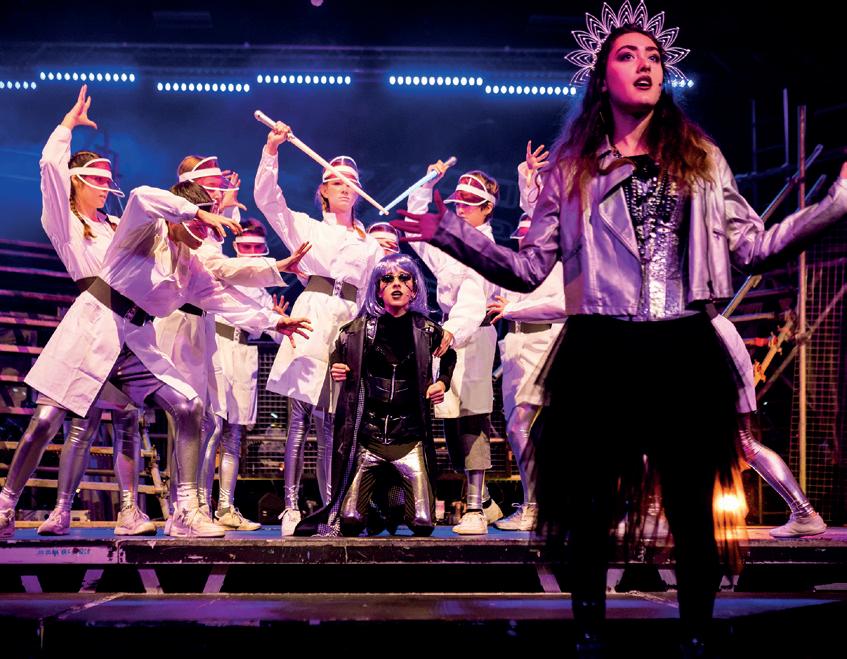
COMPARED TO SOME OF ITS LOCAL COMPETITORS.
BURSARIES ARE AT THE HEART OF SCHOOL’S ETHOS WITH ABOUT £1.3 MILLION OF FINANCIAL SUPPORT AVAILABLE.
“
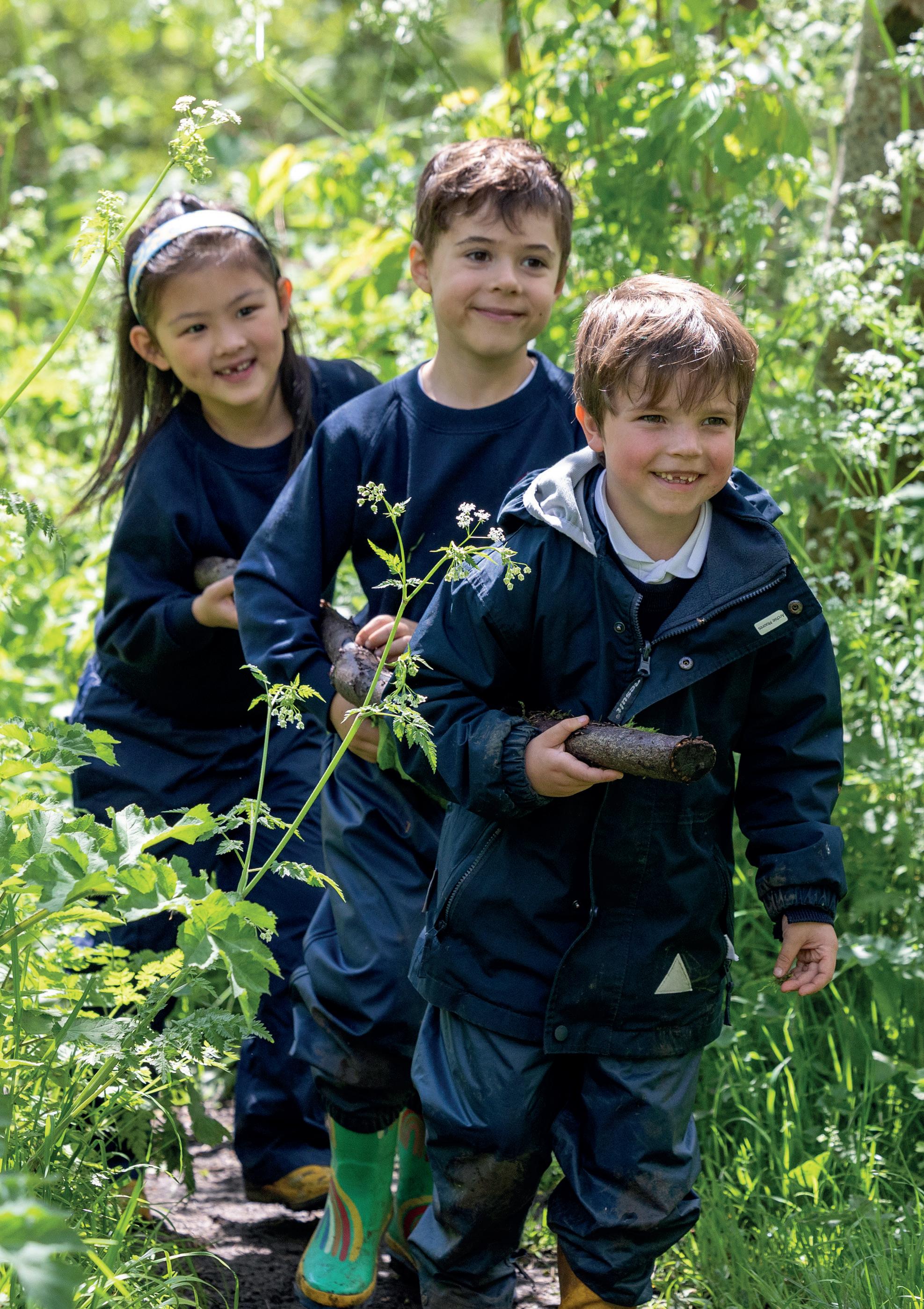
KES STATES THAT IT’S A SCHOOL FOR ‘ADVENTUROUS MINDS’ AND WE AGREE. THE ENGAGING CURRICULUM, WIDE CREATIVE ARTS OFFERING AND HOST OF CLUBS, TRIPS AND ACADEMIC COMPETITIONS, SHOULD KINDLE CURIOSITY AND A LOVE OF LEARNING IN ALL PUPILS.

Since January 2024, Sean Price, BA (English language studies, Cardiff) and PGCE, University of Bath. After a brief stint in a sales role, Mr Price cut his teeth at a primary school close to Bath before swiftly moving to Westonbirt Prep School. Started as class teacher and in the games department before becoming head of pastoral and subsequently head of the prep for eight years.
Mr Price’s firm handshake, warm smile and Welsh lilt left us in no doubt that the junior school will continue to operate in a purposeful but also very nurturing fashion. His drive to take meaningful action was corroborated by staff, ‘He’s there for the children but he’s also a decision maker – he gets things done.’ He may ‘get things done’ but he’s also down to earth and rather jolly according to the pupils (and us).
‘He’s really funny and his assemblies are great, I love his stories.’
There’s plenty to celebrate already in school, and he sees his role as being, ‘evolution not revolution.’ ‘Evolution in what?’ we asked. ‘I am so proud of what already goes on here, but I’d like to do even more outdoor education and explore the possibilities around the digital curriculum.’
Dedicated to rugby - used to play, now coaches at school and for Bath juniors, he also chaired until recently the IAPS sports committee. We did wonder who
he supports in a national game – he may live in England but the Welsh dragon on the windowsill of his office and a map of his homeland on the wall is a clear indication of who he backs in a match.
With a young son and a daughter, both at the school, and a wife who teaches English in the senior school, he seems fully invested in life at KES.
Head of the pre-prep since 2008, Jayne Gilbert (BEd hons and headship qualification, NPQH). Previously deputy head of Bedale’s pre-prep. An ISI inspector for over five years, she’s about to extend this role to include international schools.
Every morning, come rain or shine, Ms Gilbert, greets the pupils on the school gate with her gentle demeanour - no wonder the children skip into school if that’s their first encounter. Her softly spoken, kindly exterior belies the fact that she’s also a firmly determined, driven lady. One staff member added, ‘She’s always up for how we can make the school better - she’s absolutely passionate about her job and the children.’
Entry into the pre-school nursery (term-time only) and reception is via a one-hour play and stay session. For entry into years 1 and 2, it’s a full taster day. At this point school is looking to confirm children will flourish in the KES school setting. For entry into
junior school, years 3 and 5 are the key entry points (other years would be occasional spaces). All must sit assessments (English, maths and nonverbal reasoning) alongside submitting references and school reports. Pupils comes from a range of local primaries, families re-locating to Bath or from other independents.
Nearly all (90 per cent) at the pre-prep will move to the junior school. Anyone who may not cope with the slightly pacier than usual curriculum (luckily a rare occurrence) is informed well in advance. Vast majority move from the junior school to the senior school with a handful leaving for other local independents or state options, and some moving further afield.
The two sections of the school, the pre-prep and the junior, are housed in different sites across the city. Is this an issue? Absolutely not was the resounding feeling once we had visited. In fact, the school’s played a blinder and used it to its benefit. Both heads independently talked about the school having all the benefits of a big school, like shared facilities and resources, but all the advantages of a small school, like knowing the pupils well and having rules and expectations that suit a particular age and stage. Parents corroborate this sentiment with one adding, ‘It’s one school on two sites. It’s like a family, everyone knows each other so well.’ Any logistical concerns are overcome by a bus that runs between the two sites at the start and end of the day. Staff also feel that
the connection between the two sites is stronger than it’s ever been with the launch of the school-wide values and more training days and socials done together.
KES pre-prep is in a leafy suburb on the western fringes of Bath and is centred around an impressive gothic Victorian building. A little austere from the outside, inside it is anything but. The original brick-red tiled floor, warm lighting and cheerful displays of work create the perfect setting for young pupils to feel settled and ready to learn. Slightly less prepossessing buildings flank the main hub but what small child will care about architectural heritage if they are having fun inside? And that is what is so clever. The pupils are having ‘fun’, yet we were left in no doubt that they’re also learning. A lot. Make learning ‘irresistible’ is Ms Gilbert’s mantra and the preprep is successfully achieving this. Nursery and reception have inspiring zones to encourage learning through exploration. Stimulating, yes, but also calming. Much effort to have natural colours and materials – hessian backed boards, wooden play kitchens, woven baskets for toys and even a yoga pose of the week. Even on a chilly day, the doors to the outdoor areas are thrown open, it being considered an extension of the former with its al fresco painting station, creative shed and water play. Free flow activities are balanced by focused learning – Little Wandle (the newly introduced phonics programme) is seeing stellar results: most year 2s are fluent readers. We also saw reception children using chromatography to learn about primary
“
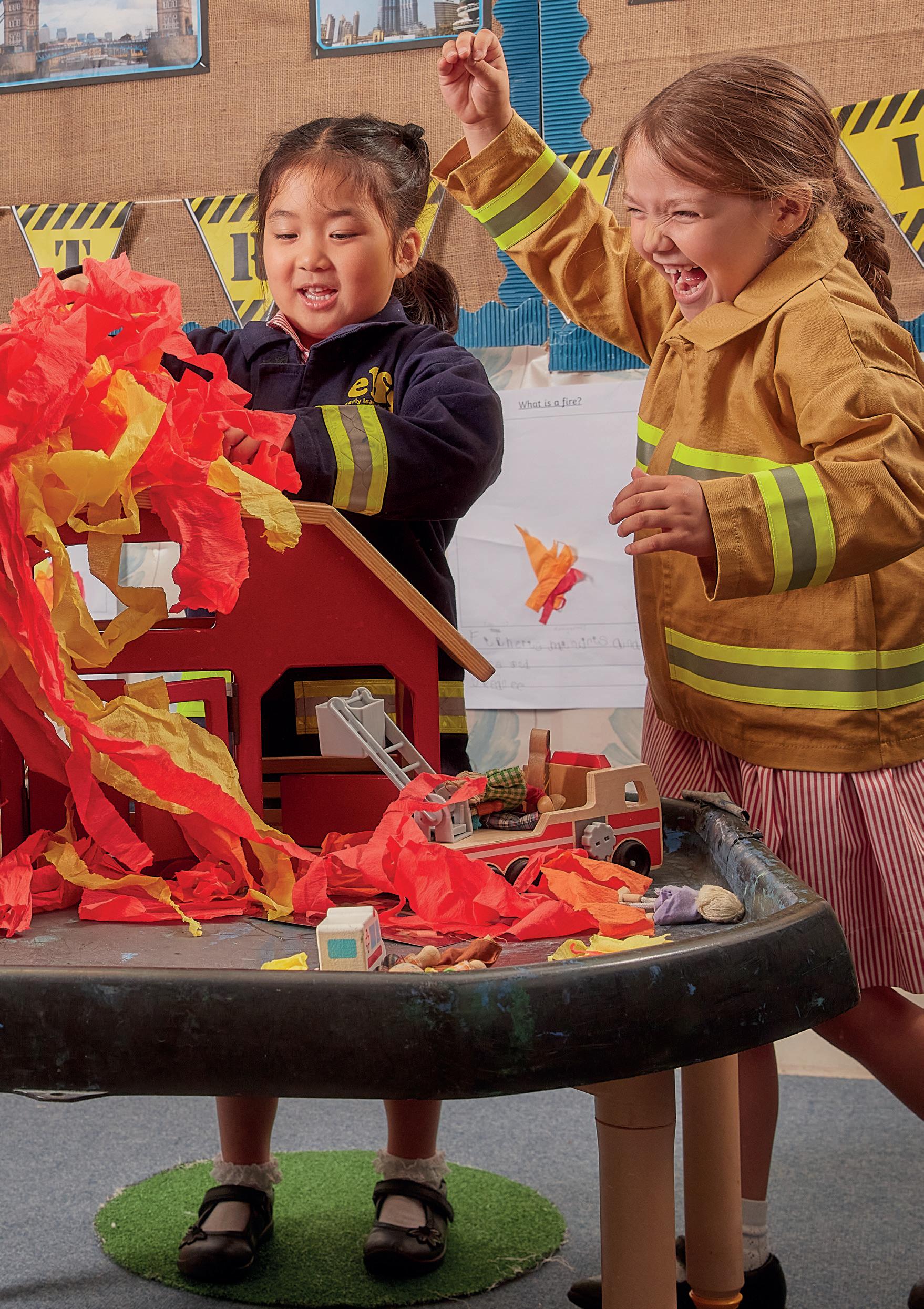
THE PUPILS ARE HAVING ‘FUN’, YET WE WERE LEFT IN NO DOUBT THAT THEY’RE ALSO LEARNING. A LOT. MAKE LEARNING ‘IRRESISTIBLE’ IS MS GILBERT’S MANTRA
colours. As the pupils reach the top of the pre-prep, learning continues to be immersive via the cross-curricular planning. A newly enlarged library is another clear signpost that learning is placed front and centre.
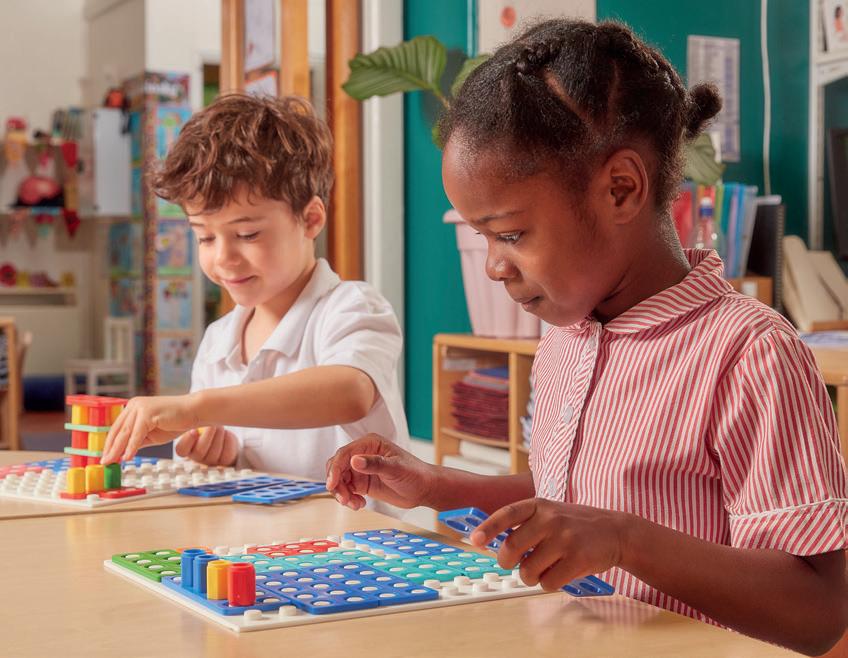
The culture that learning should be a joyful experience is successfully continued in the junior school. Here the library is the central hub of the school’s building (a stone’s throw from the senior school on the southern side of the city), signalling the importance given to academics.
In years 3 and 4, class teachers produce engaging lessons on appealing topics like the Stone Age and dragons. From year 5, all subjects are taught by specialists (some junior, some senior teachers) enabling each discipline to be championed by an expert. There’s also a proper science lab on site, a school bookshop and a myriad of competitions on offer (for which there is much take up) – national science and maths competitions, the Raspberry Pi computing challenge and there’s a plan to add general knowledge to the roster.
The academic pace is swifter than at some of its local competitors, but support is on hand when needed. There’s a dedicated SENCO in the pre-prep who also works in the junior school to ensure a smooth transition. The pre-prep has Teddy’s Den, a new learning support and wellbeing room fitted out with a sensory tent, OT equipment and space for breakout lessons. It’s used by visiting staff and TAs who have been trained to give booster sessions. External therapists and one-to-one support on offer (at an extra charge) and, higher up, the specialist teachers are carefully briefed to make accommodation for pupils. Gifted and talented children are extended through the Agora club (Greek for meeting place) in which the pupils enjoy high-level conversations on pen-suckers such as whether robots can think. Emotional wellbeing been boosted with some teachers now ELSA trained. Both heads (independent of each other) told us that if the pupils are happy and emotionally secure, they will learn.
Beyond the academics, life at KES is rich and full of opportunity with Mr Price explaining, ‘Our job is not necessarily to have fully fledged musicians or artists who are the finished article, but to give them inspiration and perhaps light a spark that could lead to this in the future.’
The creative arts pack a real punch. Art is impressive. The pre-prep benefits from a specialist coming from the senior school. The junior school’s walls and display cabinets are jammed with art in a range of media – with a kiln on site, there’s plenty of pottery and we
were impressed with year 4’s sepia pen and ink drawings. Cookery is taught on both sites. The pre-prep even has specially lowered worktops. It is part of the DT curriculum in the junior school (alongside textiles, woodwork and acrylic).
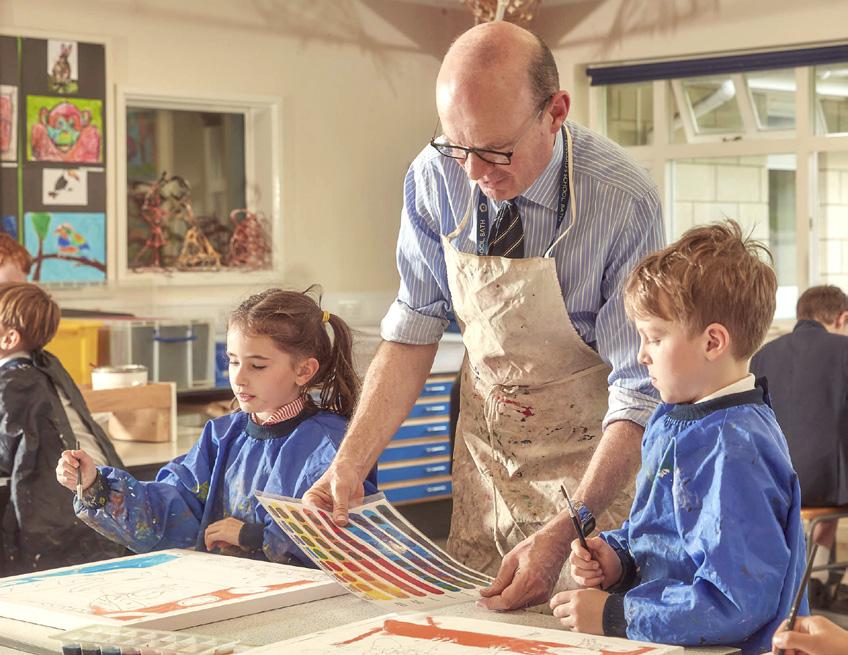
Drama starts early with nativity plays and culminates in an impressive whole school production in the junior school. Recent production of The Lion King would have been quite at home in a professional theatre with the wonderful masks and costumes.
We were blown away by the music provision. Specialist teaching right from the start and in years 3 and 4, all pupils learn an instrument during their weekly classes (strings in year 3, wind and brass in year 4) giving them exposure to playing an orchestral instrument. This might go some way to explaining why a whopping 75 percent of pupils have individual music lessons. Plenty of choirs, orchestras, ensembles and even a steel pan group to join. There’s also the chance to play in music week,
a clever opportunity for senior school involvement as they perform too. When asked what they liked about KES junior, many of the pupils loved the clubs, ‘You feel so free because there’s so much to do,’ said one. There’s a good range on offer: kit car club, doodling, sewing, dance, classics, debating, sailing and golf to name a few. Pre-prep offer a smaller, but still impressive, selection. Residential trips start young. Year 2 go away for one night (chance to subtly retrieve child before nightfall if it is too much). Longer trips for the older children with year 6 even heading to France during activities week. Closer to home, outdoor learning is part of the curriculum. Pre-prep do forest school on site and have the idyllic Teddy’s Garden for pond-dipping and gardening. Outdoor education also taught in the junior school with plans to boost this further.
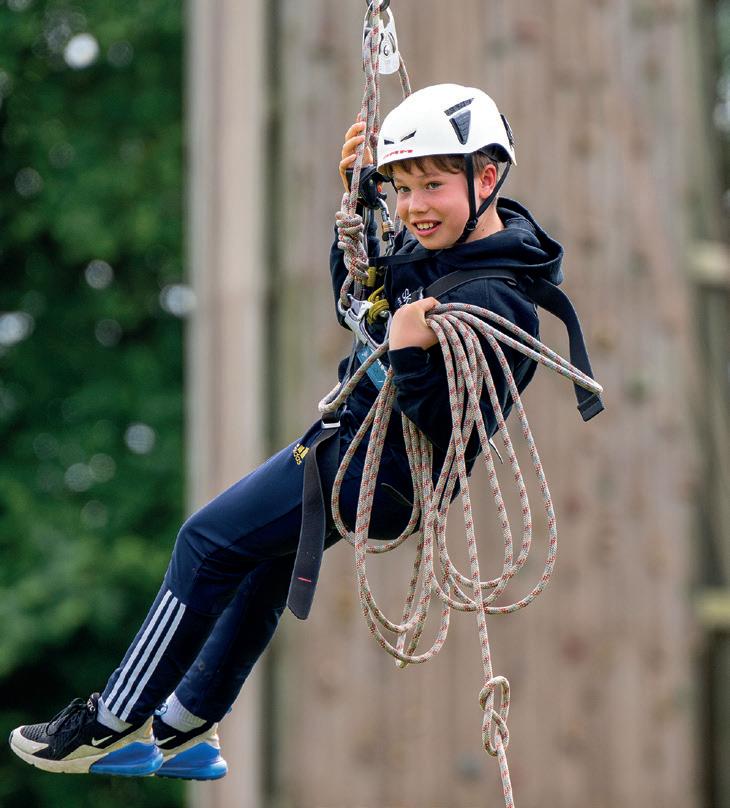
Sport in the pre-prep is run by a specialist and takes place on the Astroturf, tarmac playground and inside
their sports hall. In the junior school, some sport is played on site – there are two Astros, netball and tennis courts and a sports hall. Pitches are a short bus ride away. Lessons include teaching general ball skills, netball, rugby, cricket and PE. Rugby is popular in the senior school and equally so here – the U11s had an unbeaten IAPS Rugby Festival in 2023.
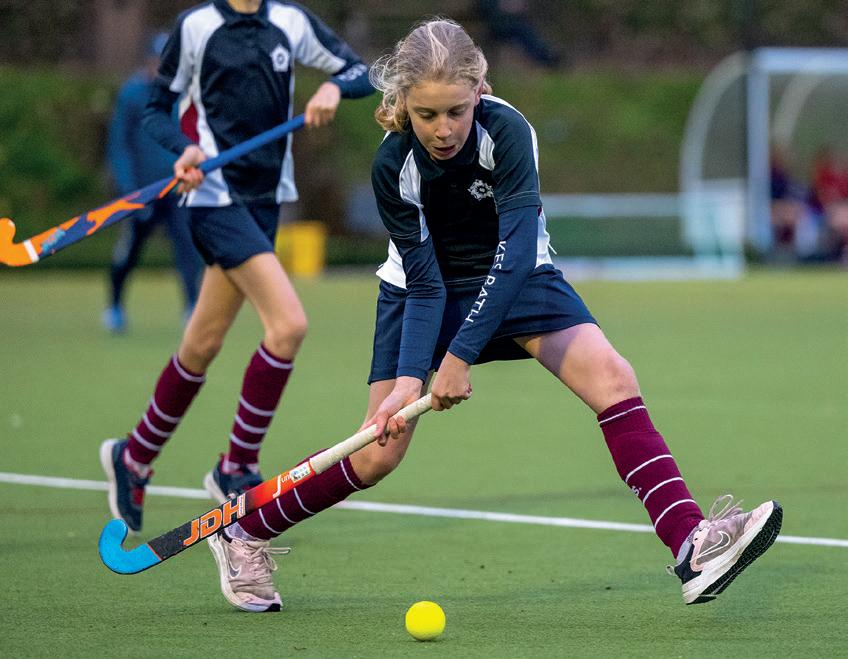
Behaviour is good and there’s recently been a move away from rules and towards expectations – ‘don’t do this, don’t do that,’ is firmly out. In the preprep this is about being ready to learn, being respectful and safe. Similarly in the junior school, they have the three R’s (ready, reset, reflect) with positive behaviour, like opening the door and politely greeting a staff member, being praised. This is encapsulated by the phrase, ‘This is how we do it here!’ This notion of respecting and valuing the pupils is being boosted further by giving them more chances to make decisions and have opinions. There’s now a whole host of committees being launched for pupils to join (houses, fundraising, sustainability and more to come). Pupil
surveys and brief pupil interviews garner even more feedback about how KES can be even better in the eyes of the children.
Pupils we met were well-mannered and particularly eloquent both to us and each other. When asked what they liked about KES one answered, ‘If the school was a colour, it would be rainbow because there’s so many different things to do.’ Much enthusiasm for school also witnessed in the younger years with one pupil launching through the pre-prep school gates announcing, ‘I can’t wait for Christingle.’
Parent communication is good in the early years. An interactive portal (ILD) enables parents and teachers to exchange photos of recent activities. Higher up, there are weekly newsletters. Parents tend to be hardworking, often dual income, local families. Many we spoke to view the junior school as an important part of their journey on to the senior school. Early morning and after school care on offer (for a small cost) at both sites.
Good value compared to others locally and few hidden extras (except lunch and the usual music lessons). No scholarships or bursaries – these start in the senior school.
KES states that it’s a school for ‘adventurous minds’ and we agree. The engaging curriculum, wide creative arts offering and host of clubs, trips and academic competitions, should kindle curiosity and a love of learning in all pupils.
“
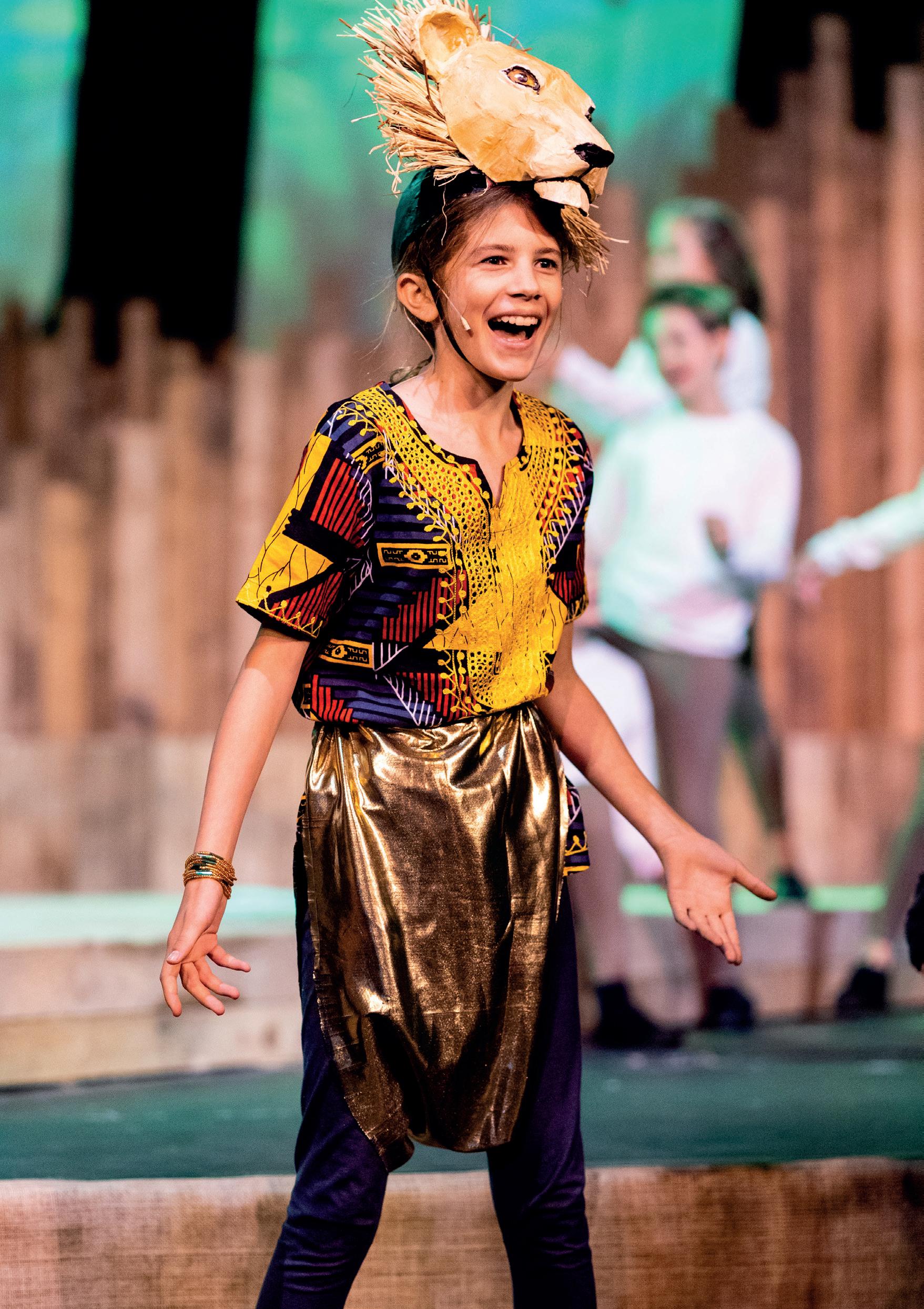
BEYOND THE ACADEMICS, LIFE AT KES IS RICH AND FULL OF OPPORTUNITY